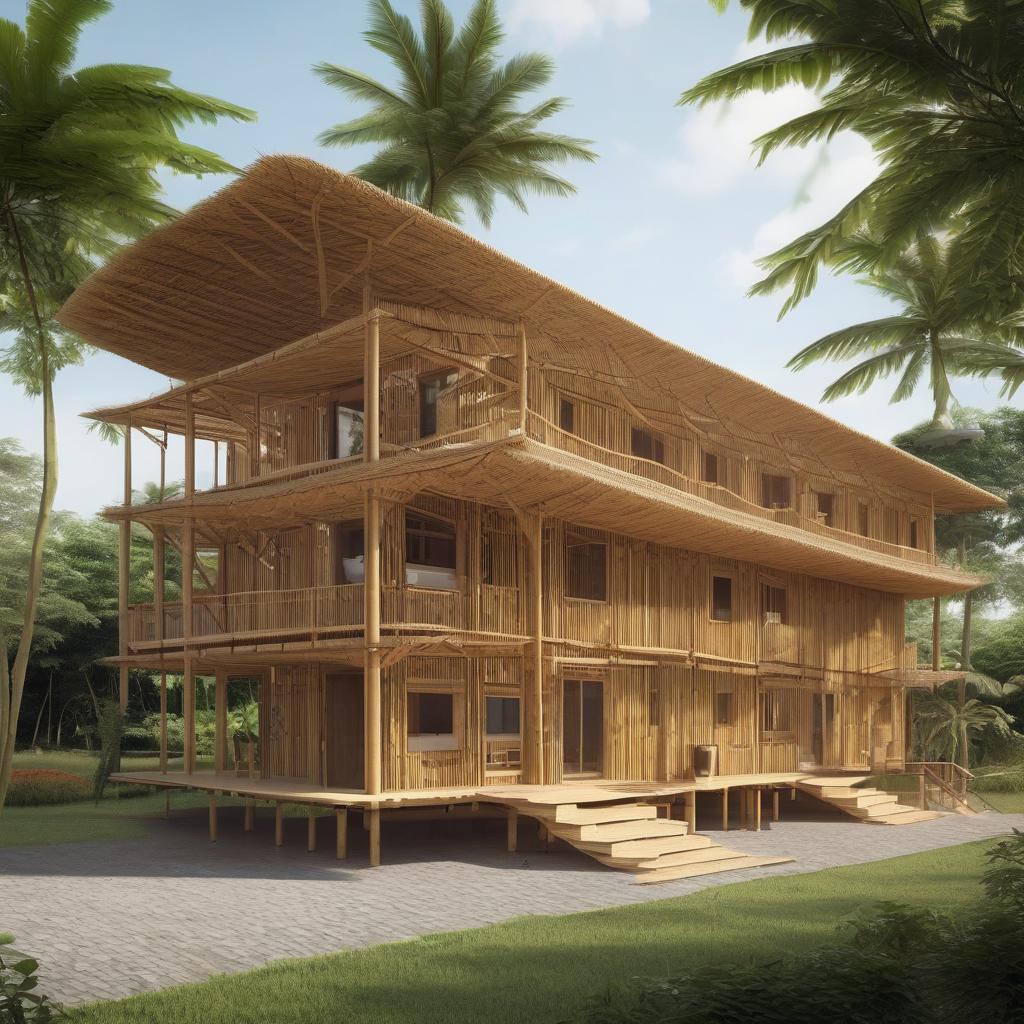Building with Bamboo in Ghana: Cost-Effective Construction
Introduction Discover the benefits of building with bamboo in Ghana—an eco-friendly, cost-effective, and sustainable construction material. Learn how bamboo offers durable, affordable solutions for modern, eco-conscious architecture. Ghana’s construction sector is booming, driven by urbanisation and population growth. However, this surge comes with challenges: rising costs, environmental degradation, and a reliance on imported materials. Enter bamboo—a versatile, sustainable, and affordable alternative. This article explores how bamboo is revolutionising Ghana’s construction landscape, offering eco-friendly solutions while empowering local communities. Why Bamboo? A Global and Local Perspective What Makes Bamboo Unique? Bamboo, often dubbed “green steel,” is a grass with remarkable properties: Rapid Growth: Some species grow up to 1 meter per day, maturing in 3–5 years (compared to 20–50 years for hardwood). Strength: Tensile strength rivals steel, making it ideal for structural use (INBAR, 2020). Carbon Sequestration: Absorbs 30% more CO₂ than trees, combating climate change (FAO, 2021). Bamboo in Ghana Ghana is home to native species like Bambusa vulgaris and Oxythenantera abyssinica, thriving in its tropical climate. Despite this abundance, bamboo remains underutilized due to misconceptions and lack of awareness. Eco-Friendly Benefits of Bamboo Construction Sustainability Renewable Resource: Harvesting bamboo doesn’t kill the plant, ensuring continuous regrowth. Low Embodied Energy: Processing bamboo requires minimal energy compared to concrete or steel (UNEP, 2019). Climate Resilience Bamboo forests prevent soil erosion and restore degraded land, critical for Ghana’s fight against deforestation (Ghana Forestry Commission, 2022). Biodegradability At the end of life, bamboo decomposes naturally, unlike synthetic materials. Cost-Effective Construction: Saving Money and Creating Jobs Affordability Material Costs: Bamboo is 50–70% cheaper than imported steel in Ghana (Booomers International, 2021). Labour Savings: Lightweight and easy to work with, reducing construction time by up to 30%. Economic Empowerment The bamboo sector could create 15,000 jobs in Ghana by 2030 through farming, processing, and construction (BARADEP, 2020). Case Study: Bamboo Bikes Initiative in Kumasi trains youth to build bicycles, showcasing bamboo’s versatility. Challenges and Solutions Durability Concerns Treatment Methods: Smoking, borax immersion, or using neem oil to deter pests (KNUST Research, 2020). Fire Resistance Coatings like clay or chemical retardants enhance fire safety. Cultural Perception Education campaigns and pilot projects (e.g., bamboo schools in the Volta Region) shift mindsets. Government and Institutional Support Ghana’s Bamboo Policy: Part of the National Climate Action Plan to promote bamboo for erosion control and housing. INBAR Partnerships: Training programs for builders and architects on modern bamboo techniques. Case Studies: Bamboo in Action Affordable Housing in Accra NGO Habitat for Humanity uses bamboo frames to build low-cost homes, slashing costs by 40%. Eco-Tourism Lodges Resorts in the Eastern Region blend bamboo aesthetics with sustainability, attracting eco-conscious tourists. Frequently Asked Questions (FAQs) Q: Is bamboo strong enough for multi-story buildings? A: Yes! Engineered bamboo composites can support up to 8 stories (INBAR, 2022). Q: How long does bamboo last? A: Properly treated, bamboo structures last 50+ years—comparable to hardwood. Q: Is bamboo construction legal in Ghana? A: Absolutely. The Ghana Building Code now includes bamboo standards (2019 amendment). Q: What maintenance is required? A: Annual inspections and reapplying protective coatings prevent decay. Conclusion Bamboo isn’t just a material—it’s a movement. By embracing bamboo, Ghana can reduce construction costs, combat climate change, and create jobs. From policy shifts to community projects, the groundwork is laid for a bamboo revolution. Support local bamboo initiatives, advocate for sustainable policies, or simply consider building with bamboo in your next project. Together, we can build a greener Ghana.
Building with Bamboo in Ghana: Cost-Effective Construction Read Post »

